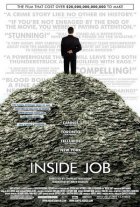
Inside Job Page #14
GLENN HUBBARD:
I don't think so, no. You certainly, you certainly wouldn't get thatimpression by the drubbing that they regularly get, uh, in Washington.
02:
24:59.12NARRATOR:
Many prominent academics quietly make fortunes while helping thefinancial industry shape public debate and government policy. The Analysis Group,
Charles River Associates, Compass Lexecon, and the Law and Economics Consulting
Group manage a multi-billion-dollar industry that provides academic experts for hire.
02:
25:20.04 Two bankers who used these services were Ralph Ciofi and MatthewTannin, Bear Stearns hedge fund managers prosecuted for securities fraud. After hiring
The Analysis Group, both were acquitted.
Glenn Hubbard was paid 100,000 dollars to testify in their defense.
02:
25:39.06CHARLES FERGUSON: Do you think that the economics discipline has, uh, a conflict of
interest problem?
GLENN HUBBARD:
I'm not sure I know what you mean.CHARLES FERGUSON: Do you think that a significant fraction of the economics
discipline, a number of economists, have financial conflicts of interests that in some way
might call into question or color –
GLENN HUBBARD:
Oh, I see what you're saying. I doubt it. You know, most academiceconomists, uh, you know, aren't wealthy businesspeople.
Inside Job transcript – Sony Pictures – September 2010
62
02:
26:05.07NARRATOR:
Hubbard makes 250,000 dollars a year as a board member of Met Life,and was formerly on the board of Capmark, a major commercial mortgage lender during
the bubble, which went bankrupt in 2009. He has also advised Nomura Securities, KKR
Financial Corporation, and many other financial firms.
02:
26:23.19 Laura Tyson, who declined to be interviewed for this film, is a professor atthe University of California, Berkeley. She was the chair of the Council of Economic
Advisers, and then director of the National Economic Council in the Clinton
administration.
Shortly after leaving government, she joined the board of Morgan Stanley, which pays
her 350,000 dollars a year.
Ruth Simmons, the president of Brown University, makes over 300,000 dollars a year on
the board of Goldman Sachs.
02:
26:55.02 Larry Summers, who as Treasury secretary played a critical role in thederegulation of derivatives, became president of Harvard in 2001. While at Harvard, he
made millions consulting to hedge funds, and millions more in speaking fees, much of it
from investment banks.
According to his federal disclosure report, Summers's net worth is between 16.5 million
and 39.5 million dollars.
02:
27:23.25 Frederic Mishkin, who returned to Columbia Business School after leavingthe Federal Reserve, reported on his federal disclosure report that his net worth was
between 6 million and 17 million dollars.
02:
27:36.14CHARLES FERGUSON: In 2006, you coauthored a study of Iceland's financial system.
FREDERIC MISHKIN: Right, right.
CHARLES FERGUSON: Iceland is also an advanced country with excellent institutions,
low corruption, rule of law. The economy has already adjusted to financial liberalization
– while prudential regulation and supervision is generally quite strong.
02:
27:53.17FREDERIC MISHKIN: Yeah. And that was the mistake. That it turns out that, uh, that
the prudential regulation and supervision was not strong in Iceland. And particularly
during this period –
Inside Job transcript – Sony Pictures – September 2010
63
CHARLES FERGUSON: So what led you to think that it was?
FREDERIC MISHKIN: I think that, uh, you're going with the information you have at, and
generally, uh, the view was that, that, uh, that Iceland had very good institutions. It was
a very advanced country –
CHARLES FERGUSON: Who told you that?
FREDERIC MISHKIN: – and [they had not] –
CHARLES FERGUSON: Who did, what kind of research –
FREDERIC MISHKIN: Well, it –
CHARLES FERGUSON: – did you do?
FREDERIC MISHKIN: – you, you talk to people, you have faith in, in, uh, the Central
Bank, which actually did fall down on the job. Uh, that, uh, clearly, it, this, uh –
CHARLES FERGUSON: Why do you have "faith" in a central bank?
FREDERIC MISHKIN: Well, that faith, you, ya, d-, because you ha-, go with the
information you have.
02:
28:30.10CHARLES FERGUSON: Um, how much were you paid to write it?
FREDERIC MISHKIN: I was paid, uh, I think the number was, uh, it's public information.
{FREDERIC MISHKIN WAS PAID $124,000
BY THE ICELANDIC CHAMBER OF COMMERCE
02:
28:43.10CHARLES FERGUSON: Uh, on your CV, the title of this report has been changed from
"Financial Stability in Iceland" to "Financial Instability in Iceland."
FREDERIC MISHKIN: Oh. Well, I don't know, if, itch-, whatever it is, is, the, uh, the
thing – if it's a typo, there's a typo.
02:
28:55.21GLENN HUBBARD:
I think what should be publicly available is whenever anybody doesresearch on a topic, that they disclose if they have any financial conflict with that
research.
Inside Job transcript – Sony Pictures – September 2010
64
CHARLES FERGUSON: But if I recall, there is no policy to that effect.
GLENN HUBBARD:
I can't imagine anybody not doing that – in terms of putting it in apaper. You would, there would be significant professional sanction for failure to do that.
02:
29:18.25CHARLES FERGUSON: I didn't see any place in the study where you indicated that you
had been paid, uh, by the Icelandic Chamber of Commerce to produce it. Um –
FREDERIC MISHKIN: No, I {MUMBLE} –
CHARLES FERGUSON: Okay.
02:
29:30.24NARRATOR:
Richard Portes, the most famous economist in Britain, and a professor atLondon Business School, was also commissioned by the Icelandic Chamber of
Commerce in 2007 to write a report which praised the Icelandic financial sector.
02:
29:44.12RICHARD PORTES:
The banks themselves are highly liquid. They've actually mademoney on the fall of the Icelandic krona.
These are strong banks; their funding, their market funding is assured for the coming
year.
These are well-run banks.
NEWSMAN:
Richard, thank you so much.NARRATOR:
Like Mishkin, Portes's report didn't disclose his payment from the IcelandicChamber of Commerce.
02:
30:03.04{JOHN CAMPBELL
CHAIRMAN:
HARVARD ECONOMICS DEPARTMENT}
CHARLES FERGUSON: Does Harvard require disclosures of financial conflict of
interest in publications?
JOHN CAMPBELL:
Um, not to my knowledge.Inside Job transcript – Sony Pictures – September 2010
65
CHARLES FERGUSON: Do you require people to report the compensation they’ve
received from outside activities?
JOHN CAMPBELL:
No.CHARLES FERGUSON: Don't you think that's a problem?
JOHN CAMPBELL:
I don't see why.02:
30:20.03CHARLES FERGUSON: Martin Feldstein being on the board of AIG; Laura Tyson going
on the board of Morgan Stanley; uh, Larry Summers making 10 million dollars a year
consulting to financial services firms; irrelevant.
Translation
Translate and read this script in other languages:
Select another language:
- - Select -
- 简体中文 (Chinese - Simplified)
- 繁體中文 (Chinese - Traditional)
- Español (Spanish)
- Esperanto (Esperanto)
- 日本語 (Japanese)
- Português (Portuguese)
- Deutsch (German)
- العربية (Arabic)
- Français (French)
- Русский (Russian)
- ಕನ್ನಡ (Kannada)
- 한국어 (Korean)
- עברית (Hebrew)
- Gaeilge (Irish)
- Українська (Ukrainian)
- اردو (Urdu)
- Magyar (Hungarian)
- मानक हिन्दी (Hindi)
- Indonesia (Indonesian)
- Italiano (Italian)
- தமிழ் (Tamil)
- Türkçe (Turkish)
- తెలుగు (Telugu)
- ภาษาไทย (Thai)
- Tiếng Việt (Vietnamese)
- Čeština (Czech)
- Polski (Polish)
- Bahasa Indonesia (Indonesian)
- Românește (Romanian)
- Nederlands (Dutch)
- Ελληνικά (Greek)
- Latinum (Latin)
- Svenska (Swedish)
- Dansk (Danish)
- Suomi (Finnish)
- فارسی (Persian)
- ייִדיש (Yiddish)
- հայերեն (Armenian)
- Norsk (Norwegian)
- English (English)
Citation
Use the citation below to add this screenplay to your bibliography:
Style:MLAChicagoAPA
"Inside Job" Scripts.com. STANDS4 LLC, 2025. Web. 24 Feb. 2025. <https://www.scripts.com/script/inside_job_42>.







Discuss this script with the community:
Report Comment
We're doing our best to make sure our content is useful, accurate and safe.
If by any chance you spot an inappropriate comment while navigating through our website please use this form to let us know, and we'll take care of it shortly.
Attachment
You need to be logged in to favorite.
Log In